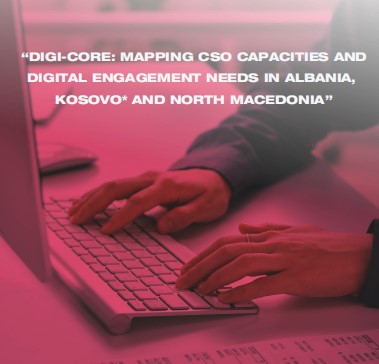
DIGI-CORE Project Report Published on Exploring the Digital Divide Among Marginalized Groups in Albania, Kosovo, and North Macedonia
The Edutask Institute, in collaboration with the Social Center for Helping People in Need (QSNNN) and Center for Social Innovations BLINK 42-21, publish the monitoring report titled, “EXPLORING THE DIGITAL DIVIDE AMONG MARGINALIZED GROUPS IN ALBANIA, KOSOVO AND NORTH MACEDONIA”. Supported by the Smart Balkans project under the DIGI-CORE project, this study examines the challenges and barriers faced by marginalized communities, such as rural populations, the elderly, women, and ethnic minorities, in accessing and using digital technologies and services in Albania, Kosovo, and North Macedonia.
How was the monitoring study conducted?
The study combined quantitative and qualitative approaches. A survey, administered in Albanian, Macedonian, and English, included 100 participants from urban and rural areas across the three countries. Data was collected via KoboToolbox and analyzed using R Studio for quantitative insights. Focus group discussions with marginalized communities provided deeper qualitative context, revealing specific challenges in digital access and literacy.
What does the study reveal?
The report highlights persistent digital disparities across the three countries. While Kosovo and North Macedonia have relatively high internet penetration rates, access remains constrained by connectivity disruptions and affordability issues. In Albania, internet usage lags significantly, with financial barriers and infrastructure gaps identified as primary obstacles.
Digital illiteracy is a major challenge, particularly among older adults and ethnic minorities, many of whom rely on family members or NGOs to navigate digital services. Even younger users primarily engage with social media and entertainment platforms, showing low confidence in using e-government services.
Despite the availability of e-government platforms, adoption rates remain limited, with a strong preference for in-person administrative interactions. Complex authentication processes, lack of awareness, and distrust in digital systems further hinder engagement. Additionally, individuals with disabilities face heightened barriers, as many government websites lack compatibility with assistive technologies.
The role of non-governmental organizations (NGOs) is critical in bridging the gap, though their efforts are hampered by limited funding and technical resources.
What solutions are proposed?
The report proposes actionable steps to narrow the digital divide:
- Upgrade digital infrastructure, prioritizing rural and underserved regions.
- Establish community-based digital hubs to provide internet access, training, and support.
- Expand digital literacy programs, including simplified, multilingual educational materials.
- Optimize e-government services to ensure user-friendliness and compatibility with assistive technologies.
- Foster public-private partnerships to subsidize device costs and internet access while promoting awareness of digital service benefits.
Why is this report important?
The digital divide remains a critical barrier to social and economic inclusion in the region. The report underscores the need for coordinated strategies among governments, the private sector, and civil society to ensure equitable access in the digital age. As the study states, “Only by investing in access, skills, and trust can we guarantee that no one is left behind.”
Raportin mund ta shkarkoni duke KLIKUAR KËTU!![]()
The grant is implemented with the support of the regional project “SMART Balkans – Civil Society for Common Values in the Western Balkans” implemented by Centar za promeno členi društva (CPCD) in partnership with the Institute for Democracy and Mediation (IDM) and the Center for Research and Policy Making (CRPM) and financially supported by the Norwegian Ministry of Foreign Affairs (NMFA).




